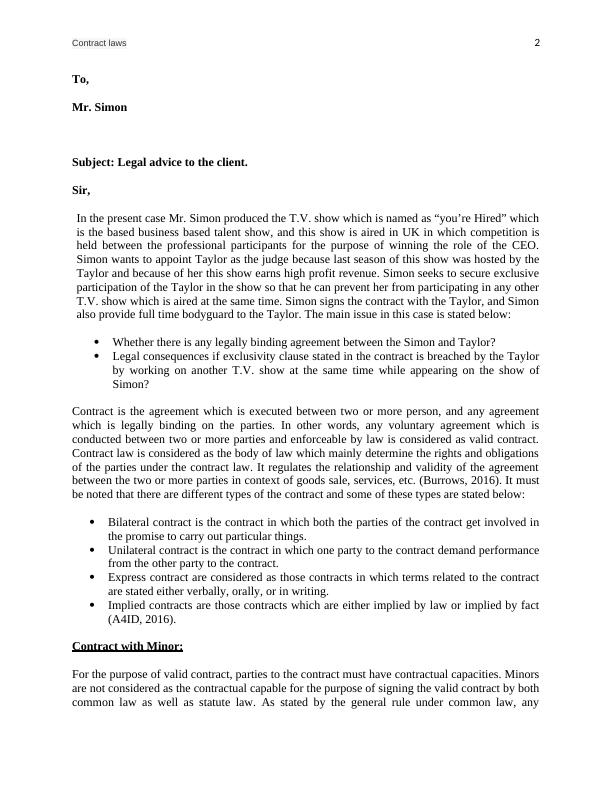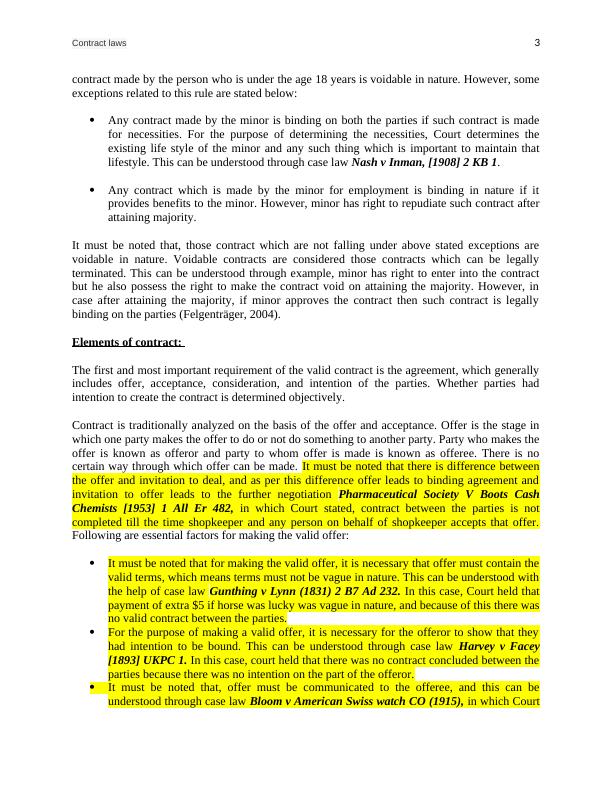Contract Laws: Elements of a Valid Contract, Exclusivity Clause, and Legal Consequences of Breach
Added on 2023-06-11
8 Pages2853 Words437 Views
Conntract laws 1
Contract Laws
Contract Laws

Contract laws 2
To,
Mr. Simon
Subject: Legal advice to the client.
Sir,
In the present case Mr. Simon produced the T.V. show which is named as “you’re Hired” which
is the based business based talent show, and this show is aired in UK in which competition is
held between the professional participants for the purpose of winning the role of the CEO.
Simon wants to appoint Taylor as the judge because last season of this show was hosted by the
Taylor and because of her this show earns high profit revenue. Simon seeks to secure exclusive
participation of the Taylor in the show so that he can prevent her from participating in any other
T.V. show which is aired at the same time. Simon signs the contract with the Taylor, and Simon
also provide full time bodyguard to the Taylor. The main issue in this case is stated below:
Whether there is any legally binding agreement between the Simon and Taylor?
Legal consequences if exclusivity clause stated in the contract is breached by the Taylor
by working on another T.V. show at the same time while appearing on the show of
Simon?
Contract is the agreement which is executed between two or more person, and any agreement
which is legally binding on the parties. In other words, any voluntary agreement which is
conducted between two or more parties and enforceable by law is considered as valid contract.
Contract law is considered as the body of law which mainly determine the rights and obligations
of the parties under the contract law. It regulates the relationship and validity of the agreement
between the two or more parties in context of goods sale, services, etc. (Burrows, 2016). It must
be noted that there are different types of the contract and some of these types are stated below:
Bilateral contract is the contract in which both the parties of the contract get involved in
the promise to carry out particular things.
Unilateral contract is the contract in which one party to the contract demand performance
from the other party to the contract.
Express contract are considered as those contracts in which terms related to the contract
are stated either verbally, orally, or in writing.
Implied contracts are those contracts which are either implied by law or implied by fact
(A4ID, 2016).
Contract with Minor:
For the purpose of valid contract, parties to the contract must have contractual capacities. Minors
are not considered as the contractual capable for the purpose of signing the valid contract by both
common law as well as statute law. As stated by the general rule under common law, any
To,
Mr. Simon
Subject: Legal advice to the client.
Sir,
In the present case Mr. Simon produced the T.V. show which is named as “you’re Hired” which
is the based business based talent show, and this show is aired in UK in which competition is
held between the professional participants for the purpose of winning the role of the CEO.
Simon wants to appoint Taylor as the judge because last season of this show was hosted by the
Taylor and because of her this show earns high profit revenue. Simon seeks to secure exclusive
participation of the Taylor in the show so that he can prevent her from participating in any other
T.V. show which is aired at the same time. Simon signs the contract with the Taylor, and Simon
also provide full time bodyguard to the Taylor. The main issue in this case is stated below:
Whether there is any legally binding agreement between the Simon and Taylor?
Legal consequences if exclusivity clause stated in the contract is breached by the Taylor
by working on another T.V. show at the same time while appearing on the show of
Simon?
Contract is the agreement which is executed between two or more person, and any agreement
which is legally binding on the parties. In other words, any voluntary agreement which is
conducted between two or more parties and enforceable by law is considered as valid contract.
Contract law is considered as the body of law which mainly determine the rights and obligations
of the parties under the contract law. It regulates the relationship and validity of the agreement
between the two or more parties in context of goods sale, services, etc. (Burrows, 2016). It must
be noted that there are different types of the contract and some of these types are stated below:
Bilateral contract is the contract in which both the parties of the contract get involved in
the promise to carry out particular things.
Unilateral contract is the contract in which one party to the contract demand performance
from the other party to the contract.
Express contract are considered as those contracts in which terms related to the contract
are stated either verbally, orally, or in writing.
Implied contracts are those contracts which are either implied by law or implied by fact
(A4ID, 2016).
Contract with Minor:
For the purpose of valid contract, parties to the contract must have contractual capacities. Minors
are not considered as the contractual capable for the purpose of signing the valid contract by both
common law as well as statute law. As stated by the general rule under common law, any

Contract laws 3
contract made by the person who is under the age 18 years is voidable in nature. However, some
exceptions related to this rule are stated below:
Any contract made by the minor is binding on both the parties if such contract is made
for necessities. For the purpose of determining the necessities, Court determines the
existing life style of the minor and any such thing which is important to maintain that
lifestyle. This can be understood through case law Nash v Inman, [1908] 2 KB 1.
Any contract which is made by the minor for employment is binding in nature if it
provides benefits to the minor. However, minor has right to repudiate such contract after
attaining majority.
It must be noted that, those contract which are not falling under above stated exceptions are
voidable in nature. Voidable contracts are considered those contracts which can be legally
terminated. This can be understood through example, minor has right to enter into the contract
but he also possess the right to make the contract void on attaining the majority. However, in
case after attaining the majority, if minor approves the contract then such contract is legally
binding on the parties (Felgenträger, 2004).
Elements of contract:
The first and most important requirement of the valid contract is the agreement, which generally
includes offer, acceptance, consideration, and intention of the parties. Whether parties had
intention to create the contract is determined objectively.
Contract is traditionally analyzed on the basis of the offer and acceptance. Offer is the stage in
which one party makes the offer to do or not do something to another party. Party who makes the
offer is known as offeror and party to whom offer is made is known as offeree. There is no
certain way through which offer can be made. It must be noted that there is difference between
the offer and invitation to deal, and as per this difference offer leads to binding agreement and
invitation to offer leads to the further negotiation Pharmaceutical Society V Boots Cash
Chemists [1953] 1 All Er 482, in which Court stated, contract between the parties is not
completed till the time shopkeeper and any person on behalf of shopkeeper accepts that offer.
Following are essential factors for making the valid offer:
It must be noted that for making the valid offer, it is necessary that offer must contain the
valid terms, which means terms must not be vague in nature. This can be understood with
the help of case law Gunthing v Lynn (1831) 2 B7 Ad 232. In this case, Court held that
payment of extra $5 if horse was lucky was vague in nature, and because of this there was
no valid contract between the parties.
For the purpose of making a valid offer, it is necessary for the offeror to show that they
had intention to be bound. This can be understood through case law Harvey v Facey
[1893] UKPC 1. In this case, court held that there was no contract concluded between the
parties because there was no intention on the part of the offeror.
It must be noted that, offer must be communicated to the offeree, and this can be
understood through case law Bloom v American Swiss watch CO (1915), in which Court
contract made by the person who is under the age 18 years is voidable in nature. However, some
exceptions related to this rule are stated below:
Any contract made by the minor is binding on both the parties if such contract is made
for necessities. For the purpose of determining the necessities, Court determines the
existing life style of the minor and any such thing which is important to maintain that
lifestyle. This can be understood through case law Nash v Inman, [1908] 2 KB 1.
Any contract which is made by the minor for employment is binding in nature if it
provides benefits to the minor. However, minor has right to repudiate such contract after
attaining majority.
It must be noted that, those contract which are not falling under above stated exceptions are
voidable in nature. Voidable contracts are considered those contracts which can be legally
terminated. This can be understood through example, minor has right to enter into the contract
but he also possess the right to make the contract void on attaining the majority. However, in
case after attaining the majority, if minor approves the contract then such contract is legally
binding on the parties (Felgenträger, 2004).
Elements of contract:
The first and most important requirement of the valid contract is the agreement, which generally
includes offer, acceptance, consideration, and intention of the parties. Whether parties had
intention to create the contract is determined objectively.
Contract is traditionally analyzed on the basis of the offer and acceptance. Offer is the stage in
which one party makes the offer to do or not do something to another party. Party who makes the
offer is known as offeror and party to whom offer is made is known as offeree. There is no
certain way through which offer can be made. It must be noted that there is difference between
the offer and invitation to deal, and as per this difference offer leads to binding agreement and
invitation to offer leads to the further negotiation Pharmaceutical Society V Boots Cash
Chemists [1953] 1 All Er 482, in which Court stated, contract between the parties is not
completed till the time shopkeeper and any person on behalf of shopkeeper accepts that offer.
Following are essential factors for making the valid offer:
It must be noted that for making the valid offer, it is necessary that offer must contain the
valid terms, which means terms must not be vague in nature. This can be understood with
the help of case law Gunthing v Lynn (1831) 2 B7 Ad 232. In this case, Court held that
payment of extra $5 if horse was lucky was vague in nature, and because of this there was
no valid contract between the parties.
For the purpose of making a valid offer, it is necessary for the offeror to show that they
had intention to be bound. This can be understood through case law Harvey v Facey
[1893] UKPC 1. In this case, court held that there was no contract concluded between the
parties because there was no intention on the part of the offeror.
It must be noted that, offer must be communicated to the offeree, and this can be
understood through case law Bloom v American Swiss watch CO (1915), in which Court

End of preview
Want to access all the pages? Upload your documents or become a member.
Related Documents
Australian Contract Law: Capacity and Validity of Contractslg...
|5
|1395
|73
Contracts and their implicationlg...
|12
|3948
|194
CASE ANALYSIS OF JULIE AND LAILA CONTRACTlg...
|11
|2957
|25
Requirements of Binding Contract Assignmentlg...
|8
|2407
|300
Contract Law and Capacity: Understanding the Requirementslg...
|5
|1329
|26
Report on Unilateral and Bilateral Contracts of Consumer Lawlg...
|8
|2313
|50
